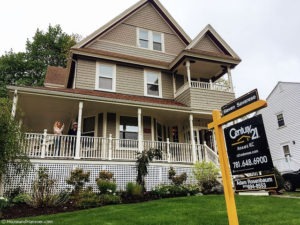Shifting the Cultural Norm
Baby Boomers are at it again . . . this time turning the housing market upside down by postponing downsizing, thereby contributing to the decline of home sales and availability for homebuyers nationwide. In turn, this has a profound effect on our move management business, as well as the businesses of many of the colleagues we work with and refer to.

Recently we came across this article about the shifts in the downsizing phenomenon and found it so interesting that we wanted to share it with you…
Real Estate Headache: Baby Boomers Who Won’t Sell Their Homes
Thanks to their sheer numbers, the baby boomers have shaped society, driving social change and the economic expansion since the 1970s. But now they’re influencing society in a new way: by holding on to their homes.
The oldest baby boomers are now in their early 70s, an age that in previous generations signaled a desire to downsize into condos and apartments. But economists are finding that boomers aren’t yet downsizing, at least not in the numbers that some of them had predicted.
That may be adding to the ongoing inventory crunch facing homebuyers, said Zillow senior economist Aaron Terrazas. Boomers are healthier and working longer than previous generations, which means they aren’t yet ready to sell their homes and strike out for retirement developments. And some may not want to sell their homes because they then must jump into the homebuyers’ market, which is suffering from low inventory and high prices.
“Several years ago there was an expectation that as baby boomers move into retirement, there would be a surge of homes hitting the market,” Terrazas said. “That really hasn’t materialized.”
That’s pinching the real estate market because Americans over 65 have the highest homeownership rate of any generation. Almost 80 percent of seniors own their homes, compared with 35 percent of Americans under age 35.
Boomers also say they intend to stay put. In a homeowner survey conducted last year byRealtor.com, 85 percent of them said they didn’t plan on selling their homes in the next year, compared with 59 percent of millennials who are homeowners.
With boomers remaining in their homes, that removes about 33 million properties from the market, Realtor.com estimated. That’s significant considering 5.5 million existing homes were sold last year, according to the National Association of Realtors.
“Moving rates and downsizing among households in their early retirement years is not very common,” wrote Oregon state senior economist Josh Lehner in a blog post about the phenomenon. “In fact it is less common today than in decades past.”
Here are three trends that are keeping boomers in their homes longer:
WORKING LONGER
Americans who are over 65 are projected to be the fastest-growing segment of the workforce over the next six years, according to the Bureau of Labor Statistics. While the overall workforce will increase 5 percent in that time, those from 65 to 74 are forecast to grow by 55 percent, the BLS said.
In May, 9.8 million Americans over 65 were working, the highest number recorded since 1948, according to BLS figures. Older workers have been remaining in the workforce in greater numbers since the 1990s, when, as in earlier decades, the typical 65-plus workforce held stable at about 3 million annually.
“Retirement today is very different than a generation ago,” Terrazas said. “Thirty years ago, when people retired, it was toward the end of their lives—when they hit 70, they were always hitting health difficulties.”
DOWNSIZING AT 80
Instead, downsizing is increasingly shifted to very old age, when Americans are in their 80s and find themselves unable to care for their homes.
“In our own research, we find the homeownership rate increases and stabilizes as you get older, but at age 83 you see more people renting,” Terrazas said. “The early 80s is when many people lose the capacity for autonomous living.”
With the oldest baby boomers now 72 years old, it could take another decade before the U.S. sees significant downsizing, he added.
KIDS ARE STILL HOME
Boomers are also coping with another generational change: Their kids who haven’t moved out. More than one-third of adult children between the age of 18 to 34 are living with their parents. That may make it tougher for the parents to decide to sell, especially in expensive markets where their children might have difficulty finding affordable homes.
https://www.cbsnews.com/news/housings-big-problem-boomers-arent-downsizing/
© 2018 CBS Interactive Inc. All Rights Reserved.
Is your business being affected by a shift in cultural norms? We would be interested to learn how you or your business are adjusting to these shifting norms Baby Boomers are presenting. Share with us on Facebook, Twitter, or at info@transitiontamers.com!
Cindy & Kandy

Comments are Closed